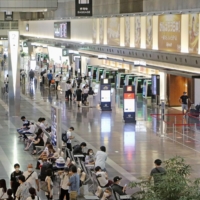More than a dozen countries and regions have been added to a list of those recognizing Japan’s vaccine passports in the past week, including Canada and France, exempting travelers from Japan from certain entry restrictions depending on the country.
The list has now grown to 34 countries and regions.
Residents of Japan can apply for a vaccine passport, which confirms that the holder has been fully inoculated, from their municipality.
The documents, however, do not exempt travelers from quarantine measures in Japan when they return. This means that all people entering the country, regardless of whether they have received a full course of a COVID-19 vaccine in Japan or abroad, are still required to self-isolate for 14 days and undergo tests for COVID-19 on arrival. People entering the country are also prohibited from using public transport and standard taxi services.
The following countries and regions were newly added to the list of territories recognizing the vaccine passports:
・Canada: Holders will be exempt from tests on arrival and a 14-day quarantine, as well as additional tests on the eighth day of the quarantine period, as long as the individual does not show any symptoms of coronavirus infection.
・France: Holders will be exempt from having to submit a negative result from a PCR or antigen test conducted within 72 hours prior to their flight. Vaccine passports will be accepted a week after the holder has received the second shot of either the Pfizer, Moderna or AstraZeneca vaccine.
・Guam: Vaccine passport holders will be exempt from a mandatory 10-day quarantine.
・Indonesia: Vaccine passports are necessary for permission to enter Indonesia, with entry only being granted to those who hold a valid residence permit, even if it is temporary. All entrants are required to submit negative COVID-19 test results before arrival, undergo an eight-day quarantine in government-approved accommodation at the entrant’s expense and undergo two PCR tests during that period.
・Singapore: Travelers need to be fully inoculated to enter Singapore. Currently, short-term visitors from Japan are essentially banned from entering the country and only those with a long-stay permit are allowed in.
・Malaysia: Travelers who arrive at least 14 days after their second dose of a COVID-19 vaccine can isolate at home or another accommodation instead of a government-designated isolation center with prior approval from the health ministry. However, entry permission is still required to enter Malaysia — the country is not currently accepting new visa applications for tourism or cultural activities purposes.
・Vietnam: Vaccine passport holders will have a reduced quarantine period of seven days, down from 14. Travelers will have to initially isolate at a designated facility but can then do so at home or another accommodation, and mandatory COVID-19 tests are performed during that period.
・Maldives: Holders will have the quarantine period reduced from 14 days to seven days. Vaccine passports will be accepted from two weeks after the holder has received their second dose.
・Palau: To board a flight to Palau, travelers need to submit a vaccine passport or other document confirming the entrant has been fully inoculated, as well as a negative COVID-19 test taken within three days before departure. The activities of all entrants are restricted during the first five days after arrival and a PCR test is performed on the fifth day.
・Samoa: As applications to enter the country are processed on an individual basis, entry permission may not be guaranteed. But vaccine passports will be required to enter the country.
Other countries also on the list:
In a time of both misinformation and too much information, quality journalism is more crucial than ever.
By subscribing, you can help us get the story right.
SUBSCRIBE NOW



